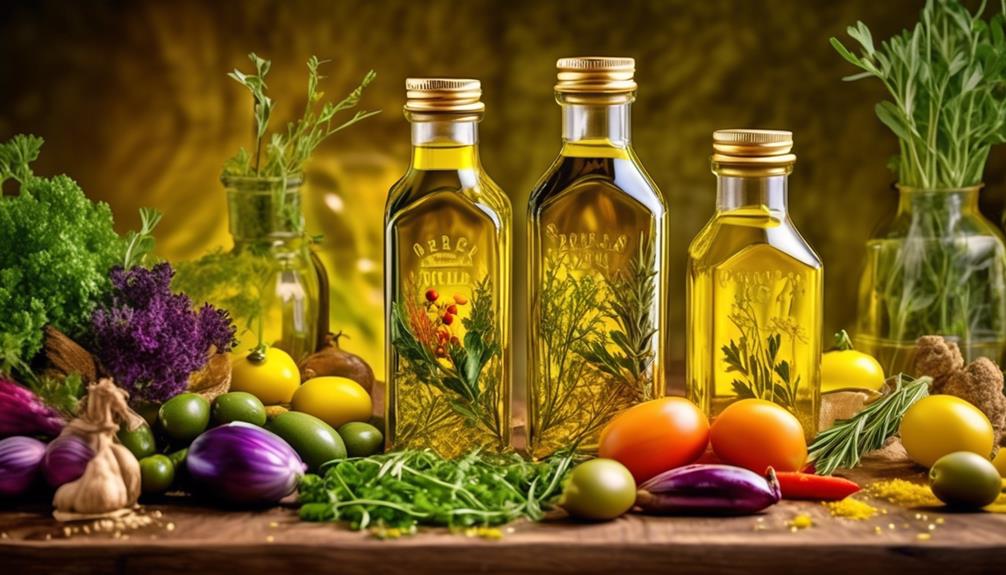Standing before a vast culinary landscape, you find yourself pondering which oil to use for your next culinary masterpiece. Olive oil and canola oil call out to you, each with their own distinct flavors and potential health benefits. But how do you decide?
Let’s delve into the characteristics of these oils, from their nutritional profiles to their cooking properties, and uncover the hidden treasures within their golden depths.
Prepare to embark on a journey that will not only tantalize your taste buds but also equip you with the knowledge to make informed decisions in the kitchen.
Key Takeaways
Choosing the right oil for your culinary masterpiece can be a daunting task. In this article, we will explore the characteristics of olive oil and canola oil, including their flavors and potential health benefits. By delving into their nutritional profiles and cooking properties, we will uncover the hidden treasures within these golden oils. This journey will not only tantalize your taste buds but also equip you with the knowledge to make informed decisions in the kitchen. So let’s get started and discover the wonders of olive oil and canola oil.
Nutritional Profiles
When comparing the nutritional profiles of olive oil and canola oil, it’s important to consider their fat content and the types of fats they contain.
Olive oil is known for its health benefits, primarily due to its high content of monounsaturated fats. These fats are good for the heart and can help lower cholesterol levels.
Canola oil, on the other hand, contains more polyunsaturated fats, specifically omega-6 fatty acids. These fats also contribute to heart health by reducing inflammation in the body.
Both oils are rich in vitamin E, an antioxidant that protects cells from damage. However, olive oil has a higher antioxidant content compared to canola oil.
Olive oil contains over 200 plant compounds, including polyphenols, which have been shown to provide numerous health benefits. These antioxidants help reduce inflammation and oxidative stress in the body, which are factors associated with various chronic diseases.
Cooking Properties
To understand the cooking properties of olive oil and canola oil, it’s important to consider their unique characteristics and how they enhance the flavors of your dishes. Canola oil has a high smoke point, which makes it great for high-heat frying methods like deep frying and searing. On the other hand, olive oil is better suited for moderate-heat frying such as pan frying, and it’s often preferred for dips, dressings, and toppings due to its strong flavor.
Here are some important points to know about the cooking properties of these oils:
- Canola oil has a mild flavor and light texture, making it versatile for various cooking methods including baking and grilling.
- Extra virgin olive oil closely resembles natural oil from olives and is commonly used as a finishing oil for cooked food and as a base for salad dressings.
- Canola oil’s high smoke point allows it to withstand high temperatures without breaking down, making it suitable for deep frying and searing.
- Olive oil, especially extra virgin, is considered healthier than canola oil due to its high antioxidant content and association with reduced risk of cardiovascular disease.
- Regular olive oil can also be used for cooking and adds a unique flavor to your dishes.
Health Benefits
Discover the impressive health benefits of olive oil, a powerful ingredient that can improve your well-being and support a healthy lifestyle. Olive oil is rich in antioxidants and healthy fats that promote heart health, reduce inflammation, and support digestive health. It has also been found to protect and nourish the skin and hair, making it a valuable addition to your beauty and skincare routines.
When it comes to cardiovascular health, olive oil is a winner. Regular consumption, especially of extra virgin olive oil, has been linked to a lower risk of cardiovascular disease. It can also improve blood sugar levels and reduce LDL cholesterol and triglyceride levels, which are key factors in preventing heart disease.
But the benefits of olive oil don’t stop there. It has also been associated with a lower risk of stroke and may even help protect against type 2 diabetes. Its anti-inflammatory properties and high antioxidant content make it a healthier choice compared to canola oil.
Speaking of canola oil, it’s worth noting that olive oil has a higher smoke point than canola oil. This means that it can withstand higher temperatures without breaking down and releasing harmful compounds. So not only does olive oil offer numerous health benefits, but it also performs better in the kitchen.
Comparison of Antioxidant Content
Olive oil has a higher antioxidant content compared to canola oil, making it a healthier choice. The polyphenol content in olive oil varies depending on the processing method, with extra virgin olive oil containing the highest amount of polyphenols. On the other hand, regular olive oil has a lower polyphenol count due to the refining process, while canola oil has a relatively lower antioxidant content. In terms of antioxidant levels, olive oil, especially extra virgin, surpasses canola oil.
Here are five key points to consider when comparing the antioxidant content of olive oil and canola oil:
- Olive oil contains more than 200 plant compounds, including polyphenols, which have been linked to a reduced risk of heart disease and other chronic conditions.
- Extra virgin olive oil, with its high polyphenol content, provides even greater antioxidant benefits compared to regular olive oil.
- Canola oil, on the other hand, has a lower antioxidant content compared to olive oil, making it less effective in protecting against oxidative stress and inflammation.
- Canola oil’s higher smoke point makes it suitable for high-heat cooking, but it doesn’t offer the same level of antioxidant benefits as olive oil.
- While canola oil is a good source of omega-6 fats and polyunsaturated fats, which are beneficial for cardiovascular health, the higher antioxidant content of olive oil makes it a better choice in terms of overall health benefits.
Frying Capabilities
When it comes to frying, both canola oil and olive oil have their own unique characteristics and advantages. Canola oil is great for high-heat frying methods such as deep frying and searing because it has a high smoke point. On the other hand, olive oil is better suited for pan frying and other moderate-heat cooking methods, making it a versatile choice for various culinary applications.
To better understand their frying capabilities, let’s take a look at the table below:
| Oil | Smoke Point | Recommended Cooking Methods |
|---|---|---|
| Canola Oil | 400-450°F | Deep frying, searing |
| Olive Oil | 350-410°F | Pan frying, sautéing |
As shown in the table, canola oil has a higher smoke point, which means it can handle higher temperatures without breaking down and producing smoke. This makes it ideal for deep frying, where the oil needs to reach and maintain a high temperature to achieve crispy results.
Olive oil, on the other hand, has a lower smoke point but still performs well in pan frying and sautéing. Its natural flavors can add depth and richness to your dishes, especially when using extra virgin olive oil for dips, dressings, and toppings.
Both oils have their own nutritional considerations as well. Canola oil contains omega-6 fatty acids, which in excess may contribute to inflammation and potentially increase the risk of heart disease and diabetes. On the other hand, olive oil contains antioxidants that can help protect against heart disease and other chronic conditions.
Frequently Asked Questions
Is Canola Oil Better Than Olive Oil?
Canola oil has its advantages, but when comparing it to olive oil, the latter comes out on top. Olive oil, especially extra virgin, is considered healthier, with numerous studies showing its association with a reduced risk of heart disease and improved blood sugar levels.
What Is the Healthiest Oil to Cook With?
The healthiest oil to cook with depends on your personal preferences and dietary needs. Olive oil and canola oil are two options to consider as they offer different benefits and are suitable for various cooking methods. It’s important to choose an oil that suits your specific requirements and tastes.
What Are the Pros and Cons of Olive Oil?
Olive oil has many advantages. It contains antioxidants and healthy fats that support heart health and reduce inflammation. However, it is important to consider the disadvantages and consult with your doctor for personalized advice.
Is Extra Virgin Olive Oil or Olive Oil Better for Cooking?
Extra Virgin Olive Oil is the preferred choice for cooking compared to regular Olive Oil. It undergoes minimal processing, which helps retain its nutrients and antioxidants. Additionally, its rich flavor enhances the taste of dishes. Moreover, it is a healthier option due to its various health benefits.


[…] your digestive system by increasing your fat intake throughout the day with foods like avocado, olive oil, fatty fish, nuts, and […]